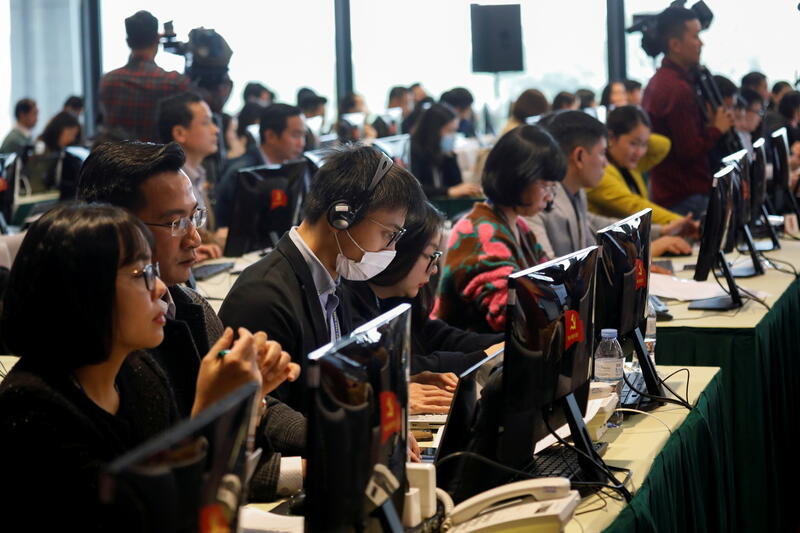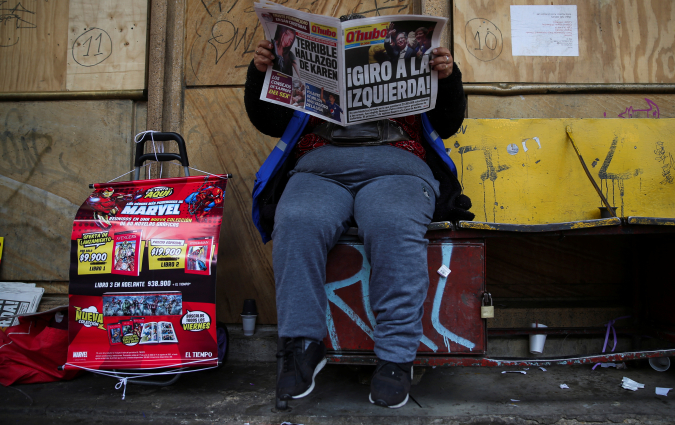What the COVID-19 pandemic means for freelance journalists in the Global South

Journalists cover the national congress of the ruling Communist Party of Vietnam in January 2021. REUTERS/Kham
The pandemic has made a devastating impact on the media industry. Access to important stories has been challenged by travel and safety restrictions. Bustling newsrooms have been replaced by makeshift home offices. For many, covering the pandemic has involved safety and health dangers, including the impact on mental health or the risk of burnout from reporting on such a long-running story.
Without the backing of newsrooms, these problems have been especially difficult for freelance journalists who live and work in the Global South. As part of a new report for the Thomson Reuters Foundation, author Damian Radcliffe spoke to 55 journalists from 26 countries about their experiences during the pandemic. Reporting restrictions and challenges, health and safety, misinformation, digital dependency, negative economics and mental health were all raised as repeated concerns.
Emerging Radcliffe’s research is a story of how the pandemic has compounded the often already precarious position of freelance journalists in these regions. As a freelance photojournalist in India put it: “I have got limited assignments during this time (…) Most clients have shown a lot of concern though few have offered hazard pay. But all the risky shoots have eventually fallen through. Just yesterday a US-based publication decided to cancel an assignment due to security concerns as it required travelling to a remote area where mask protocols may not be followed.”
Freelance journalism could be seen as an industry growth sector in the past 12 months for all the wrong reasons. Job cuts at media houses mean there are more journalists entering this sector of the industry. This creates more competition just as freelance budget cuts for contributors reduce opportunities. One estimate for the US put the total of newsroom journalism jobs lost at 11,027 for the first six months of 2020 alone, while the New York Times estimates the number affected by job losses, furlough or pay cuts to be 37,000.
Money matters
While this is a global pattern amongst freelancers, rates for local media in the Global South are already likely to be lower, making a decline in opportunities from international outlets even tougher.
The beginning of the pandemic in particular was an “assignment desert”, says Diogo Rodriguez, a freelance journalist based in São Paulo, Brazil, who writes about technology, entrepreneurship, science and lifestyle topics for titles including Motherboard and The Brazilian Report.
“The uncertainty that hit us last year made everybody more cautious because the first couple of months were very scary. We were just focused on trying to get by financially and in everyday life,” he says. Personal savings helped Rodriguez stay “above water”. He also diversified his income by producing materials for textbooks and a series for teachers and students about the impacts of the pandemic.
“When the pandemic began [lockdowns were broadly introduced in Brazil in May 2020], I noticed a steep decrease in people asking me for stories or any kind of material,” he says. “No one was spending much money. The publishers were trying to work out what to do and weren’t assigning much to freelancers. I did manage to get work but it was different kinds of work than usual.”
For other freelance journalists, freelancing has offered a means to adapt to uncertain times. “The pandemic affects the economy and that includes media houses,” says Kehinde Ogunyale, a freelance investigative journalist based in Lagos, Nigeria. “Freelancers could shift to other places, but if I was a staff member of a particular media house, the job security would be quite slim.”
Indian journalist Jaishree Kumar agrees. She reports on politics, gender, sexuality and culture from New Delhi, India and started freelancing full-time in the midst of the pandemic. While moving in-house would offer a fixed monthly income, there are fewer roles available and a less supportive environment for young journalists with little mentoring on offer. “Anyone who’s coming into the industry right now in India knows there’s no point getting a staff job. They’re going to make you work twice as hard and pay you half. The balance is uneven,” she says.
Time to learn new skills
Nigerian journalist Ogunyale sees the past year as “a win and a loss”. Pandemic restrictions in the first half of 2020 delayed stories he had planned to report, but time stuck at home and a desire to better report on the impact of the pandemic itself encouraged him to learn new skills, including fact-checking and data journalism. His first fact-checking report published in May earned him a nomination for one of Africa Check’s 2020 African Fact-Checking Awards.
Sen Nguyen, a freelance journalist based in Vietnam who reports for English for international media outlets, says the pandemic has been both a challenge and “an opportunity to grow”. While her pre-pandemic plans to travel around South-East Asia and establish herself as a regional journalist have been put on hold, reporting on a global health crisis has resulted in multiple features and news stories, particularly because of the interest in Vietnam’s response to the virus. She’s reported multiple angles on COVID-19, from its impact on street vendors and migrant workers to food security and animal welfare.
“Vietnam’s success in containing the outbreaks exceptionally quickly and more effectively than many other countries has made the country an outlier and generated lots of international appetite to know more,” says Nguyen. “I saw this and thought I could feed that.”
The TRF report also found that the shift to online training during the pandemic had made it easier for some freelancers in the Global South to access courses in hard skills such as data journalism.
New times, new sources
The pandemic has also forced Ogunyale to change some journalistic fundamentals, including how to source stories. A report on local entrepreneurs creating nose masks and another one on inflation rates affecting food prices during the pandemic were both sparked from a conversation he overheard while sitting outside his house.
“These stories would never have happened in previous years, because I wouldn’t have been at home to hear that conversation,” he says. “[Lockdown at home] gave me quiet time to reflect on how to generate stories from home that address issues and still become the talk of the town.”
Travel restrictions encouraged Ogunyale to work with other reporters to access information from different areas safely and remotely. This collaborative and cost-effective approach has remained even as restrictions have eased, he says, though the inability to conduct face-to-face interviews, especially with sources for sensitive investigations has been more difficult. Many of these subjects are already afraid to tell their story or share information and just don’t want to talk over the phone, he says.
Safety concerns
In New Delhi, Kumar says she has had to make changes to stories she wanted to report because of safety concerns. Even when restrictions on domestic travel were eased, a journey to remote villages or rural areas from a city could put those communities at risk, she says. The safety of her family was also a consideration: “I live with my grandfather so I avoided travelling because I was very afraid that if I went out he could catch COVID-19.”
The freelancers interviewed for the TRF report said they had not been supplied with protective equipment for reporting assignments. Public health guidelines were adhered to. But when safety and health could not be assured, they refrained from reporting in the field. “There was a strong sense that if you were in-house you were much more likely to be looked after, but for a lot of freelancers, they had to fend for themselves,” explains Radcliffe, author of the report. Freelancers were typically less able to procure safety equipment.
Vietnamese journalist Nguyen had to balance personal safety considerations with the ability to report effectively during the early stages of the pandemic. When interviewing street vendors for a story, she decided not to wear a mask because there were no community transmissions reported in the country at the time: “The people I interviewed were not masked themselves, so I made a judgement call and decided against the mask because I wanted to gain their trust and build a connection with them. If the virus had been raging in the country at the time, I would not have lowered my defences,” she says.
As one freelancer in India featured in the report says, as yet, they have had no training on how to cover COVID-19: “[O]ne does feel very vulnerable especially when you have to travel, as no organisation tells you how much they will help if you show symptoms and need to be quarantined outside your home state.”
When covering the pandemic, freelancers have had to put themselves at risk. Ogunyale recalls reporters contracting COVID-19 after visiting the first isolation centres established for patients in Nigeria to document the government’s response.
According to the International Press Institute, 473 media freedom violations around the world can so far be linked to COVID-19 coverage. In countries in the Global South where media freedom is already at risk and without more protection for journalists as frontline workers, it becomes harder to challenge restrictions or control over pandemic information.
“A growing clampdown on media freedoms is easier to push back against with a newsroom and a legal department; it’s very hard for a freelancer to do,” says Radcliffe, who stresses this is an important consideration when thinking about how we can support this growing industry sector.
Online learning and communities
As a recently graduated journalist, Kumar says online communities have been helpful during this time, providing a chance to connect with other freelancers and learn new skills. She’s attended courses on building independent newsletters and taken time to learn more on how to run a business as a freelance journalist.
Brazilian journalist Rodriguez says the pandemic has given him the opportunity to focus on diversifying his income and looking at ways to become more entrepreneurial, a long-held ambition which has resulted in the launch of his own news platforms Me Explica and Respiro. Me Explica publishes explainers analysing any trending news stories in Brazil, from politics to forest fires in the Amazon and Pantanal. Respiro, a weekly wellness newsletter launched in October 2020, offers readers tools to cope with mental health issues.
Unlike this freelancer’s experience, however, Radcliffe’s research suggests that much of the learning of new skills by freelancers “has been more accidental rather than intentional”. There needs to be much more training on offer to Global South journalists on hard and soft skills, he says, including how to be a freelancer during this kind of crisis and how to set up and run your own business.
Not their first rodeo
While the move to remote learning may have made international training sessions more open to some in the Global South, there are few non-Anglophone resources and many courses are devised by or aimed at journalists in the Global North. In regions where internet access is unreliable or costly, participating in online communities or training is unrealistic. Working remotely also comes at a greater cost.
“Access to community tools might not be so common. Issues relating to a digital divide are a huge cause of stress and bring additional financial challenges,” says Radcliffe. “Your very real costs [of working and participating online] are going up and opportunities are being lost.”
For many journalists in the Global South, COVID-19 is not their first experience of reporting on and through a pandemic. From Zika in Brazil to Ebola in parts of West Africa and outbreaks of SARS and MERS in the Middle East, Africa, China and South Asia, it’s crucial to learn from journalists in societies where this isn’t their first experience of a pandemic, says Radcliffe.
Radcliffe would like to see training programmes from those countries teaching Western journalists how to cover pandemics safely and well: “We don’t have enough consideration of the fact that there are many parts of the world where this isn’t their first rodeo”.
Supporting freelance journalists
In terms of greater support for freelance journalists, respondents to Radcliffe’s research suggested the availability of emergency funds for those experiencing economic hardship, more training initiatives and the need for more opportunities from larger, international outlets given the higher rate of pay these publications typically provide compared to outlets in their countries.
The pandemic provides an opportunity to recognise that “there are experts on the ground who know the story and patch better than in-house people ever will”, but taking advantage of that requires greater responsibility from international organisations.
“They may be able to tell stories for an international publication that they could never tell for a domestic publication,” says Radcliffe. “But I don’t think I’ve heard international organisations talking about what their role is in supporting this wider ecosystem, especially at a time when you can’t send your correspondent out to particular areas.”
In Brazil, Rodriguez says local journalism organisations need to step up with support networks and even events to help freelancers. He is only aware of a few financial support grants on offer to freelancers during the pandemic and recently started his own WhatsApp group for those working in journalism in Brazil.
“Freelancers in Brazil lack a lot of support,” he says. “Journalism organisations in Brazil aren’t paying attention to this [growing sector] even though there are more freelancers or people launching their own entrepreneurial outlets.”
While the COVID-19 pandemic has brought opportunities and new skills to freelance journalists in the Global South, it has undoubtedly highlighted and in some cases exacerbated the risks that this sector faces. In its wake, it’s critical to ensure that support networks grow and that existing assistance and media freedoms aren’t rolled back even further.
Laura Oliver is a freelance journalist based in the UK. She has written for the 'Guardian', BBC, 'The Week' and more. She is a visiting lecturer in online journalism at City, University of London, and works as an audience strategy consultant for newsrooms. You can find her work here.







